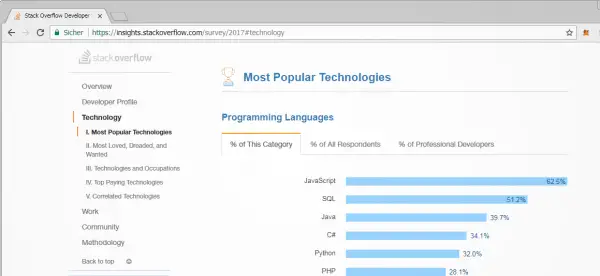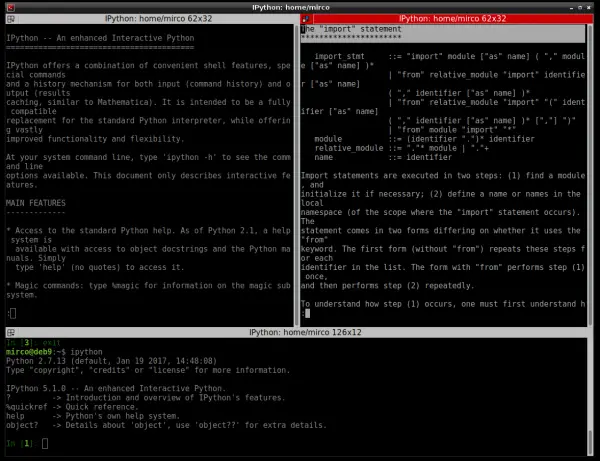Learning to program is a long, difficult journey - and if the first few hundred kilometers are in the wrong direction, you will likely break off the journey and sit on the couch. So you should think twice about which programming language you start with!
Selection criteria
There are many ways to choose the best programming language to get started with - and there will never be an unambiguous answer. Are you looking for a language that is particularly easy to learn? A language for a specific area of application? Should it give you the best job opportunities? Or maybe the maximum salary? Or should it be the most popular? Most popular? Depending on your answer, a different language should pop up. And even there there are different sources with not always the same results ... But well, let's try to find recommendations for a couple of these areas. A good source, for example, is the Stack Overflow survey .
In terms of popularity , there is a clear message here: JavaScript is ahead with 62.5 percent, followed by SQL with 51.2 percent. But is that helpful to you? Only to a limited extent: SQL is simply used everywhere for databases and is not at all suitable for general programming entry. JavaScript, on the other hand, could be interesting.
The best job and salary prospects ? With Stack Overflow, a distinction is made between web and desktop developers, admins and data engineers - and almost everywhere the most common answer is again JavaScript , only among desktop programmers it only comes in second place. JavaScript is becoming even more interesting. In terms of salaries, JavaScript employees are only 21st worldwide, in Germany at least 6th, with an annual salary of a good 51,000 US dollars. That is just 2,000 euros less than the front runner Java.
And what do developers want ? The most popular language among respondents is Rust , which only applies to coders who (have to) work with it. Under "Most Wanted" Python and, again, JavaScript are in places 1 and 2. On the other hand, at least 40 percent of those surveyed say that they would rather not continue to work with JavaScript - a statistic in which Python only has a lot shows up later..
 The Stack Overflow Study is an excellent source of information!
The Stack Overflow Study is an excellent source of information!
Do you want to work on a specific area ? Then it becomes difficult. PHP, for example, is passionately hated because it's not really good technically. On the other hand, a large part of all websites is made up of PHP code to a large extent! As a web developer, at some point you will hardly get around it. Do you want to develop programs that run as perfectly as possible and get really deep into computer science? Then there is the classic C , the much more practical C ++ , but above all Java at. All three languages are very powerful, allow the most basic work and are also very popular with companies in the commercial environment. Java is quite good to get started with, C not at all and C ++ only for those who are really, really serious!
Now it's getting really exciting: Are you looking for a language that is easy to learn ? There are two well-known winners here, if you look, for example, at what is used for programming courses at American universities : Python and Java are clearly ahead here. This is followed by Matlab for mathematical matters as well as C and C ++, which are increasingly being replaced by Java.
With all these buzzwords, three candidates keep cropping up: JavaScript, Java and Python . Java and Python are both suitable for pretty much all purposes, JavaScript is aimed almost exclusively at web developers. And that would also be our starting recommendations: JavaScript, if you want to work primarily on interactive websites and the like, and Python for a general introduction to programming - because it is the most popular language of both developers and teachers.
General introduction: Python
Python has basically established itself as the egg-laying woolly milk sow in recent years. You will find discussions in many places on the net whether Python is a scripting language or a "real" programming language , but you can make it easy for yourself: The inventor of Python, Guido von Rossum, calls Python a " universal all-purpose programming language " and that fits too. With Python you can write small scripts for everyday admin, but also monolithic desktop programs for customers..
The Python code remains relatively easy to read, which helps a lot when getting started. There are also tons of free learning materials ; No matter whether you are looking for an introduction to a specific topic, entire online tutorials, programming aids directly in the browser or training programs for the desktop - you will find a large selection. But even after the learning phase, if you want to become productive, the Python world supports you, among other things with many useful, free libraries. Such libraries contain standard functions that not every Python developer has to reinvent for every project. For example, a number of Matlab functions can be recreated with NumPy - except that NumPy is of course available free of charge.
Python simply offers the best overall package : It is open source, developers love it, teachers love it, it is absolutely universally applicable, aids for learning and programming are abundant, you can try your hand at the first little hacks on hundreds of thousands of open source projects and all of this remains the same but relatively easy to read. Python is therefore clearly our tip for your first steps in programming .
 There are a number of good tools for Python, such as the interactive shell IPython - including great help!
There are a number of good tools for Python, such as the interactive shell IPython - including great help! And last but not least, a tip for the lucky ones: If you have a good friend or relative who programs himself and whom you can pound with questions, it is best to use their standard language. Because with all the good documentation on the net: At the beginning you will be asked a number of questions that are not always answered specifically for your case, but just something similar. And especially with questions about syntax you will waste hours searching, although the questions are usually hardly more difficult to answer for a reasonably experienced programmer than the question of the time. The best entry language is the one for which you are allowed to abuse friends as private lecturers . Well, if it's your grandpa and he comes around the corner with assembler - then I prefer Python.
For web developers: JavaScript
Of course, there are also developers who are less interested in the whole cosmos of programming than in business and design. So if you are more interested in knitting fancy, interactive websites or perhaps starting your own start-up as a business student, JavaScript is not a bad alternative. The professional chances are also very good, because JavaScript developers can probably start in almost any web service provider office , even the smallest ones. Basically, the same applies here as for Python, thanks to a huge community.